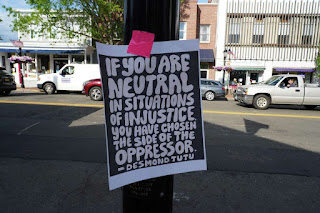Biting Your Own Ass
When I was randomly browsing on the internet one day, I came upon a video clipping that summarized the movie based on the tragic story of Emmett Till. The clipping was narrated in Chinese. At the end of that post, a lot of comments by Chinese viewers ensued.
To my surprise, the majority of the commentators had little sympathy for Emmett Till. They put the blame on him and his mother: "He knew he was black. Why did he visit the south?" "His mother should know better than to let her boy go to such a place by himself. Her fault!" "A black boy should know better how to behave. He asked for it." "His mother did not raise him right. She got him killed." A few people raised the issue of racism, but these rare voices of conscience were brutally lynched by the unsympathetic netizen mob.
Historically, Chinese people and the country of China as a whole, have suffered a lot from racism. Could the years of suppression have bred too much anger and hatred among people? Or is it over-compensation for a diminished self image? There are derogatory Chinese nicknames for Japanese, Indians, white Europeans, Africans, . . . Pretty much everybody is either some kind of unworthy object or some kind of ghost. The only group that is consistently referred to as people is, sure enough, Chinese people. So, although they complain about how they are treated by other people, yes, Chinese people can be very condescending and racist, too.
Over the years, I, myself, have received a good share of racist treatment as I wander the world. When I was studying in France, I was referred to as the "petite chinoise" (little Chinese) by many French people, despite the fact that I was taller than most of them. I was treated as if I were stupid because my French was "not good enough". And then, here in the US, a former supervisor questioned the quality of my education because he did not know my schools in Hong Kong or France. As he was interviewing me over the phone, with my application letter in his hand, he asked me if I could read, write or speak English at a "native level", as if there were some kind of standard language proficiency among native speakers. Needless to say, I also have met people who told me to go back to where I came from . . .
I am not the only person in this country to have experienced racism. Such opportunities are abundant everywhere for people of color. Otherwise, why did we have the Civil Rights Movement? And Black Lives Matter?
One would think: if you have experienced racism and find that unfair and repugnant, you would develop the awareness to not inflict that kind of pain and injustice upon others. Nevertheless, when people of color face each other, they start treating each other funny. Everybody has their own notions about where different ethnic groups belong in their mental pecking order. Stereotypes about the other groups kick in. Among the discriminated, they discriminate against each other, too.
Worse still, some people of color mistreat their own as if they, themselves, believe their people do not deserve any better. The many cases of police brutality by black officers against black people are good examples of such unfortunate behavior.
Read ['Am I Racist?' You May Not Like The Answer]
If people would just pause and think about what they are doing, they may realize they are supporting the notion that people are inferior/ superior because of their color and country of origin. While they do not like being stomped on, they do not think twice to put other groups under their feet. By doing so, they are endorsing the very institute they are fighting, perpetuating racism that will turn around to hurt themselves in no time.
Individual racism is unpleasant enough. Institutional racism is even worse. The minority suffers for certain, but at the institutional level, racism actually hurts the society as a whole.
It would be nice if people try to to make friends of different skin colors. To make the world a better place, however, that is not enough. At the personal level, we need to recognize our internal biases and take responsibility for our actions. As a society, we need to change the system fundamentally. There is no other way.
There is "Doing things right" and there is "Doing the right things". What have you been doing?



Comments
Post a Comment